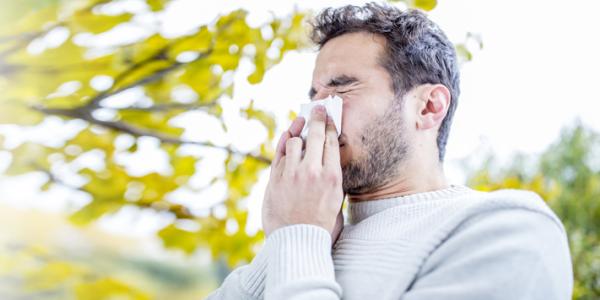
April showers may bring May flowers, but May flowers unfortunately bring allergies as well. As many of us already know, the beauty of spring can be dampened by the seasonal allergens that come out in full force from April through June and beyond.
According to the CDC, more than 50 million Americans suffer from allergies, making it the sixth leading cause of chronic illness in the US. Some symptoms, like coughing, sneezing, a runny nose, itchy eyes, and a scratchy throat, are a serious nuisance. Severe symptoms, like rashes, hives, low blood pressure, breathing trouble, or asthma attacks, can even be life-threatening.
Allergy Treatment
Treatment depends on the nature and severity of your allergy symptoms. If your nose is involved (allergic rhinitis) and your symptoms are relatively mild, your doctor will likely recommend a non-sedating over-the-counter antihistamine such as Loratadine, Fexofenadine, Cetirizine, or Levocetirizine. Do not take a sedating antihistamine like Diphenhydramine. This medication affects concentration and impairs your ability to drive or operate heavy machinery. In addition, chronic use of sedating antihistamines has been associated with dementia in patients over 65-years old.
If rhinitis persists, the next step is to try an over-the-counter nasal steroid, such as Fluticasone or Triamcinolone. This type of medication should be stopped if it triggers a nosebleed. If you have glaucoma, you will need to talk to your doctor before using this kind of medication. If symptoms still persist, you'll need to get an exact diagnosis and seek an advanced treatment, including allergen immunotherapy.
Tips to Keep Allergens at Bay
- Pay attention to the pollen forecast for your area by checking an online resource such as www.pollen.com. If the pollen count is high and/or the weather dry and windy, stay home.
- If you must go outside, wear a mask. Take your shoes off as soon as you go back inside to keep from spreading allergens on carpets and rugs. Then, change your clothing and put them in the washing machine, NOT in your closet or bedroom.
- Shower and wash your hair before bed.
- Vacuum regularly including drapes and upholstery.
- Consider buying a HEPA filter.
- Keep your windows closed on windy days and when you go to bed at night. You could wake up to a breezy, wheezy day.
- Don't drive with the windows open. Recirculate the air in your car instead.
- As much as possible, keep pets indoors while the pollen count is high and bathe them frequently.
And remember that you don't need to suffer through the season. If your allergies are frequent or getting worse, be sure to talk to your doctor about getting an effective treatment.
This article first appeared in the April 2023 edition of the HealthPerks newsletter.

